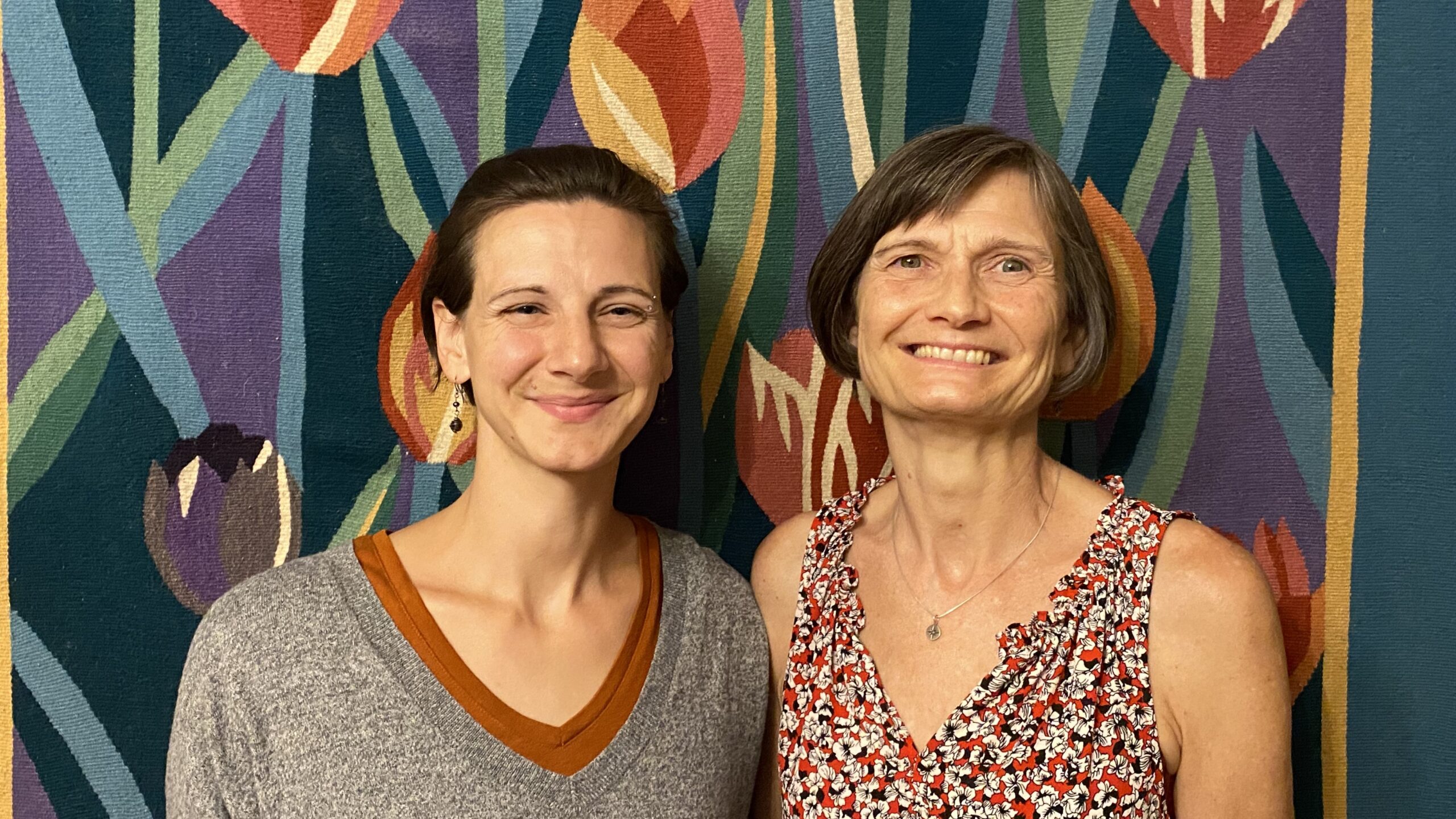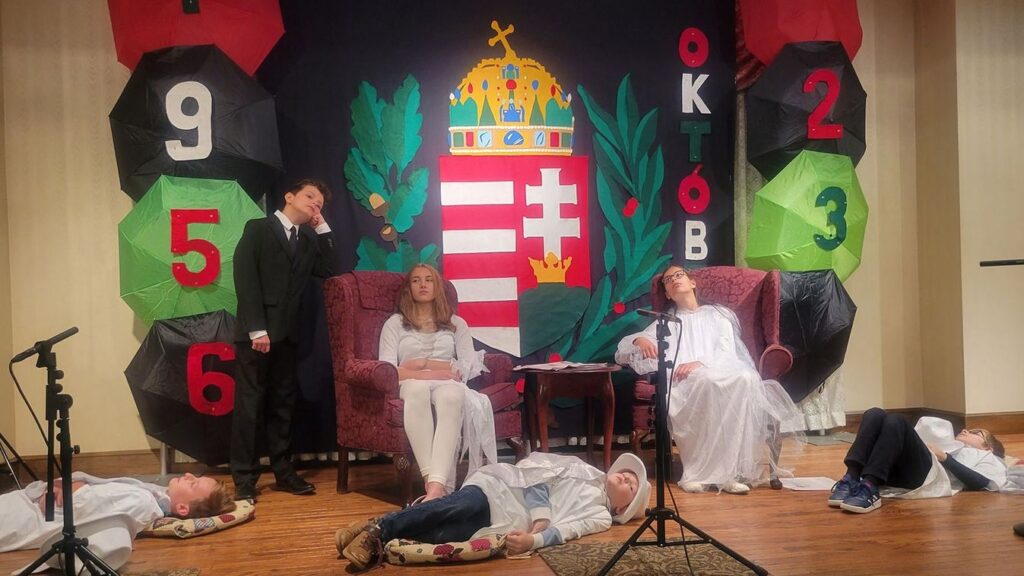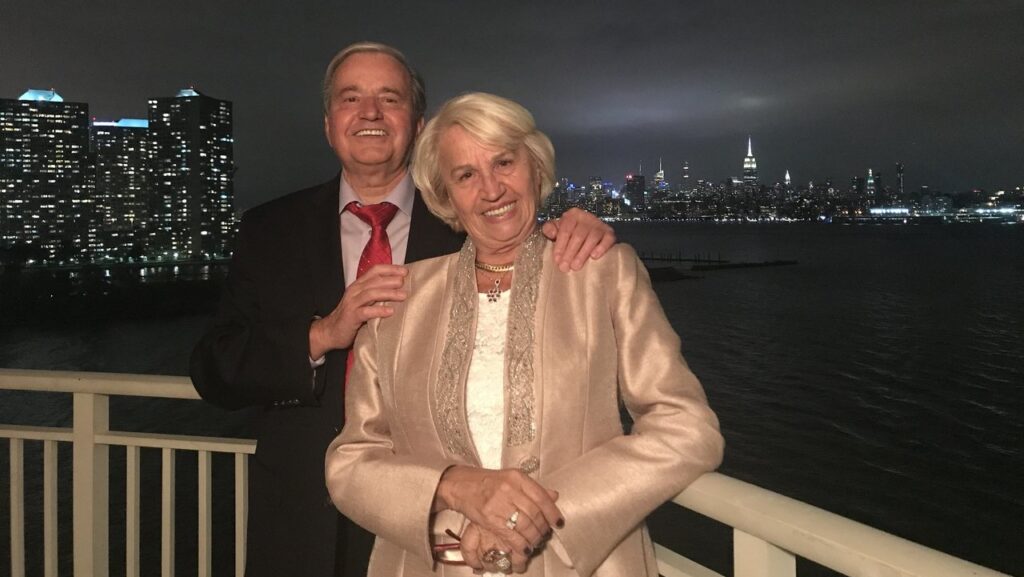Enikő Gorondi is the founder and headmaster of perhaps the only daily Hungarian educational institution in the U.S., the Aprókfalva Hungarian Preschool in Piscataway, New Jersey. It is a Montessori-based learning pod that has been in operation for the last 18 years. Enikő came to the U.S. at the age of ten and has made her home here, both as an American citizen and as a member of the Hungarian community in New Brunswick, New Jersey. Her daughter, Réka works as a teacher at Aprókfalva, is a Hungarian scout leader and also a folk dance teacher of the youngest group of the local Mákvirág Hungarian folk dance ensemble in New Brunswick.
***
Why and how did your family come to the U.S.?
Enikő: My parents were Catholics in Hungary. My mother was a very talented preschool and kindergarten teacher and my father was a tool and die maker. Still, we remained second class citizens, because my parents refused to join the communist party. To make matters worse, they were part of a Catholic youth group that disguised themselves as a hiking club. They went for hikes in the hills of Hungary, and the priest would hold mass in the woods. My parents made sure my brother Zsolt and I received religious education in secret. For me, as a child, living with this moral duality was both difficult and confusing. At the same time, I was having difficulty in school, hindered by both the shortcomings of a traditional educational system run by under-qualified party members and by partisan teachers who rewarded grades partly based on the child’s family background rather than personal achievement in class. In 1967, my father was awarded a pass to be part of a bus tour in Vienna for his company’s outing. He never returned from that trip. The police came to our house to search for evidence of his whereabouts, but came up empty-handed. My father hadn’t warned any of us of his plans to dissent. It was a very difficult time. The police interrogated my mother several times, she lost her job because of the scandal, we had to sell everything we owned and still didn’t get to eat every day. After my mother was institutionalized for a nervous breakdown, we managed to settle down in the country with the help of some relatives. Finally, we got a letter from our father informing us that he was fine. After spending a year in Austria, as an illegal and then a refugee, he received a visa to emigrate to the U.S.
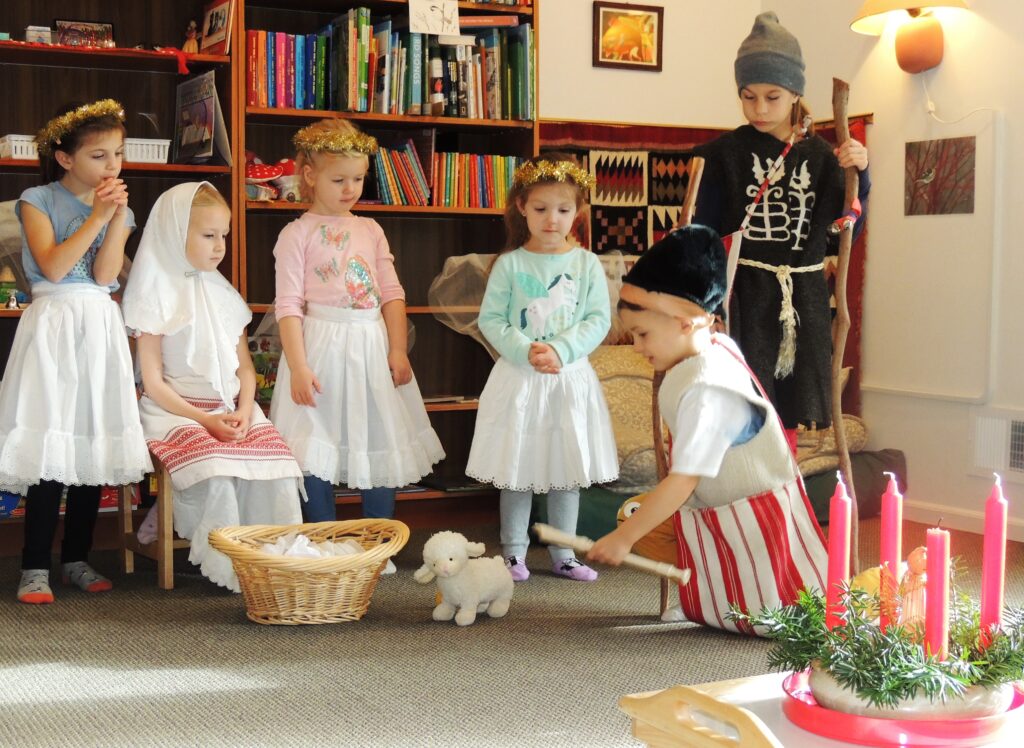
When did you manage to follow him?
Enikő: My mother spent years trying to get a visa to the U.S. She took my brother Zsolt and me with her to various government offices to help plead her case of reuniting the family. My father couldn’t return, but we could go to him perhaps. Our relatives all encouraged her to move on and remarry—even my father’s family. But she stayed true to him. She worked hard to keep us afloat and did a very good job of it. In truth, she didn’t want to leave. She kept hoping that the Soviet regime would fall and her husband would return. But in 1972, the communist regime was still in power and the long-awaited visa arrived for us to go to the States and live with my father. My mother burst into tears. She was torn by the news. As a ten-year-old, I was livid. I didn’t want to leave my home, my friends, and my family. When we arrived in the States, things only got worse for me. None of us spoke the language and, for a place dubbed ‘the land of the free’, it sure felt like a prison. In Budapest, I had wandered wherever I wished, on foot or public transportation. In the States, there was nowhere you could go without a car. It was tough. To me, my father was a stranger. I often got beat up at school. But, at least, we had a place to live in the St. Ladislaus Hungarian Catholic Church’s building in New Brunswick. The church is still there, but in recent years the diocese has been working on closing the parish. Now, the doors are locked unless there’s mass or other programs. Back then, their doors were always open and I found myself there often to calm my restless soul. I didn’t feel at home in the U.S. I kept dreaming of being old enough to go back. I was 16 when I first got to visit Hungary again. It was a strange feeling. By then, I was a fluent English speaker and had picked up many American customs and ways of thinking. Hungary didn’t feel like home anymore. It was a frustrating realization. I felt like I didn’t belong anywhere until I met my husband.
How did you meet him?
Enikő: Jancsi Gorondi’s family is originally Hungarian, all his brothers were born there. My father-in-law was in the military during World War II, so they were persecuted under the Soviet takeover of Hungary. They spent several difficult years in refugee camps in Italy, battling even starvation at times. There was no school for the three young boys, either. Finally, they were accepted to emigrate to Argentina, where Jancsi was born in 1951. His father was originally a fencing champion in Hungary, so Jancsi decided to follow in his footsteps. He was a junior national champion and even won the South American continental championship while in high school. He was preparing for the Olympics when the first of three consecutive guerrilla wars broke out in the country. He served as an agent in the Federal Police before getting a scholarship to study in the U.S. He was just about done with university and was planning on returning to Argentina to dedicate himself to resurrecting the economy and improving life for the people when we met at a Catholic retreat. Father Ádám was a Jesuit priest and university professor, who had undertaken to hold a retreat for Hungarian American teenagers once a year with the support of the Hungarian Knights of Malta. It was a safe environment for like-minded youths to meet from around the area. I was 17 and rather innocent, he was 11 years older. We got married as soon as I turned 19. We’d both finally made a home of the U.S.
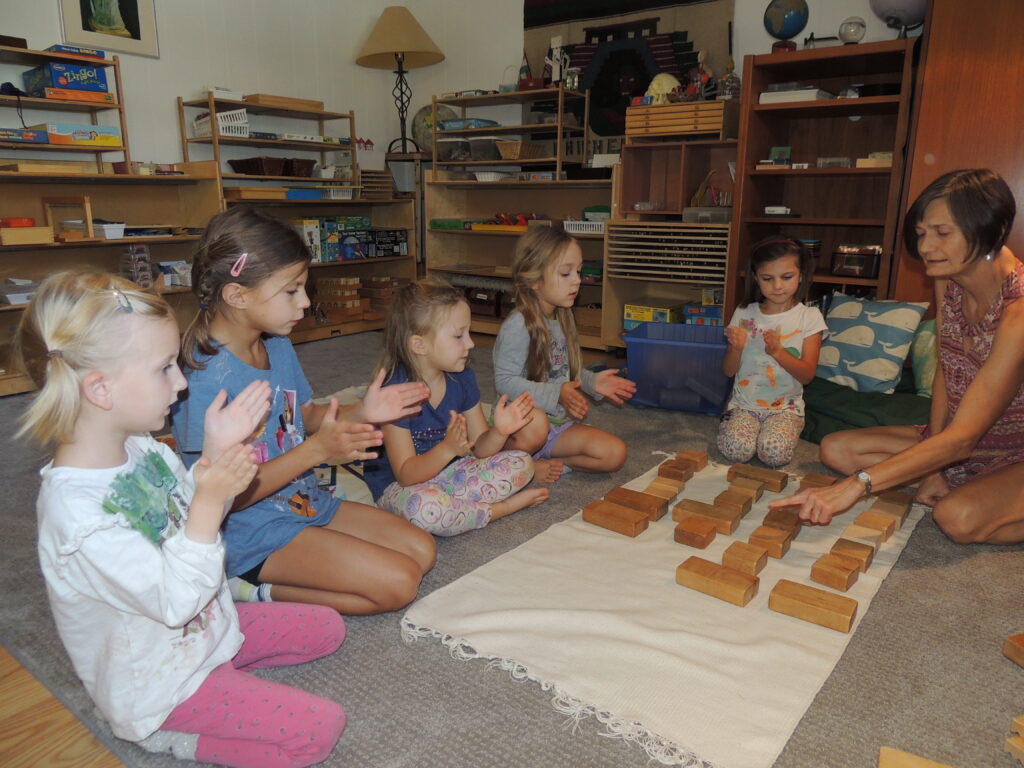
In addition to your two daughters, you had adopted two more. Why?
Enikő: I always wanted a lot of children. I kept hearing about all the orphans in the world, so I was very motivated to adopt. Still, I wanted to practice on my own children first because everyone kept telling me how much harder it is to raise children you’re not related to. So we had our two daughters, Csilla in 1983 and Réka in 1985. After that, we were turned away by adoption agencies. They didn’t want to give children out to couples that were able to have their own, and there were other bureaucratic complications. So I had given up on that. Then a situation arose with my niece Lizzy, my brother-in-law’s daughter. For various reasons, she wound up joining our family when she was 11, but she had spent every summer home-schooled by my daughters in the two years leading up to that. She didn’t speak any Hungarian, but decided to learn of her own volition in order to join her sisters in extracurricular activities: the Hungarian Scouts, the Hungarian School, and hanging out with other Hungarian American friends. At one point, after my parents had retired to Hungary, we sent her to an equestrian camp in Hungary. She came back speaking fluently. We are very proud of her. The last child to join our family isn’t an official member, but we all consider her family all the same. She is a Chinese immigrant from Taiwan and Csilla’s high school classmate, Samantha. In her case, it was more that she adopted us than the other way around. Her parents were in Taiwan and she didn’t get along so well with her official guardian here. She just moved in one day, joined the Széchenyi Hungarian Saturday School’s adult class and seamlessly blended right in.
Where did the idea of starting a daily Hungarian kindergarten come from?
Enikő: I didn’t actually start that. Ágnes Gergácz wanted her grandchildren to speak Hungarian and was determined to have a daily preschool and kindergarten for that purpose. Her daughter Magdi was very good at finances. They’re the ones that recruited my mother to start up the daily Hungarian Preschool in a building owned by the St. Ladislaus church in New Brunswick. That’s what later became one of the buildings of the current Széchenyi István Hungarian Saturday School and Kindergarten. They were able to gather a few Hungarian fairy tale books, a doll and a teddy bear. That’s all they had, but my mother was very creative, running a very educational and interactive program for children, teaching them songs, rhymes, and movement games. I was sixteen at the time, but I also helped out, even substituting for my mother when she got sick. She stayed there as a preschool teacher until both of my daughters started kindergarten. By then, the Hungarian population in New Brunswick had diminished. There wasn’t enough interest to keep the daily preschool open, but it continued on as a weekend school.
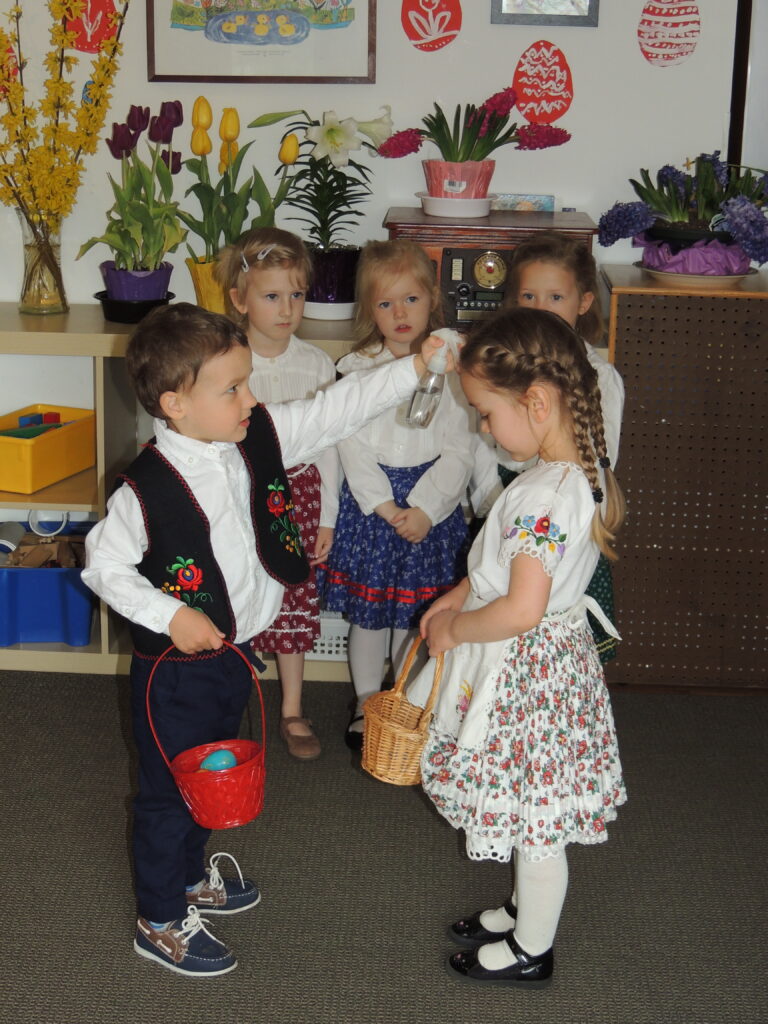
How did the family kindergarten in its current form actually start?
Enikő: Personally, I didn’t want to be a preschool or kindergarten teacher. I saw how much time and energy my mother put into it and I felt that these would be better spent on raising my own children. But as my children were growing up, I started to miss it. I decided to complete a Montessori training course in Princeton and I worked at an American Montessori kindergarten. When Jancsi lost his job, I had to find something that paid better. So I worked at a regular kindergarten, but that was very frustrating. I felt that a lot of the staff was less concerned about what would be the best for the children and much more so about avoiding lawsuits. A lot of focus was put on memorizing things children often didn’t understand yet, while physical education, self-care skills, and problem-solving were completely neglected. This is very limiting for child development. During this time some parents contacted me about resuming my mother’s work, providing daily education in Hungarian. After much consideration and failing to secure a building for it, Jancsi and I decided to convert the ground floor of our house and open the Montessori Preschool there. We opened our doors in September 2006, starting with five very young children and one nanny. The number of applicants grew rapidly and we have been operating at maximum capacity ever since. My primary role is, of course, teaching the children, but I find it equally important to educate my staff and the parents as well. Children attend Aprókfalva for a few years, but they live with their parents most of their lives. If the lessons we teach here are not reflected at home—not just academic lessons, but values, world views, and problem-solving skills—then it’s all for naught.
‘My primary role is, of course, teaching the children, but I find it equally important to educate my staff and the parents as well’
Réka: At the time, I completed a bachelor’s degree at Rutgers, then completed my veterinarian degree at Szent István University in Budapest. In the meantime, I got married, bought a house with my husband Torda, and we were expecting our first child. The reason we could afford the house was because it was in serious need of renovation. But we needed to live somewhere, so we moved upstairs at my parents’ house. Since I was home with a baby, later with a baby and a toddler, I helped out where I could. That’s how my first two children were literally born into Aprókfalva. During free play, the children liked to play with the baby and I could help with the administrative duties in the meantime. We moved out once we finished renovating our house, but I continued to bring the children—by that time we had three—to the preschool. When the children became old enough to attend officially, I started working there full time. When my oldest was about to start public school, the pandemic broke out. Public education became remote, therefore we opened the upstairs of the house as well and added a learning pod group to Aprókfalva: children ranging from first to third grade. I taught this mixed age group. We took a great deal of precautions and got through the pandemic without any problems. It was a lot of work. There was a vast age range of children and we had to cook for 30 people every day. Since then, most of them have returned to public school, but we still have a small group of students in the learning pod, including the older two of my three children.
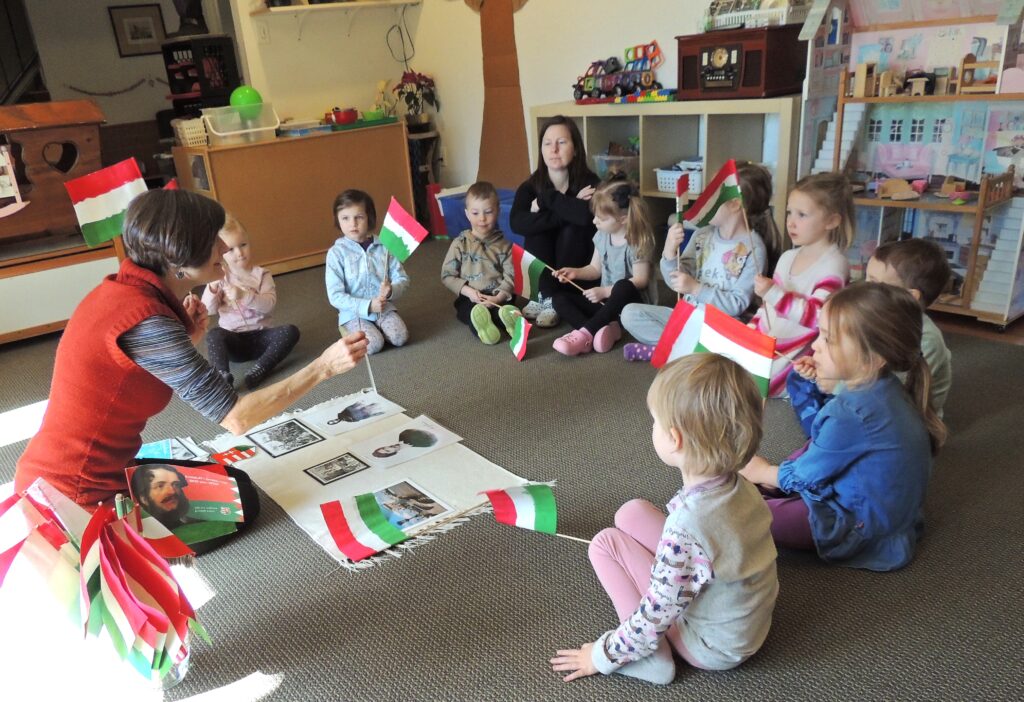
You also volunteer a lot in the Hungarian community: you are an active adult scout leader and an instructor at the local children’s folk dance group.
Réka: I grew up as a Hungarian scout and a member of the local folk dance group. When I turned 16, I became a scout leader and joined the adult dance group Csűrdöngölő. I learned a lot from the older dancers, especially Denisa Varga-Bott, who did serious research on dance theory, regional particularities, and even showed us old documentaries of local traditional dancers. I had to leave all that behind when I was studying in Hungary, then motherhood and the preschool—I had a lot on my plate. When my children got old enough to start dancing and participating in scouting, I became active again in both as well. I wanted them to get as much a quality program as I did, so it was natural to help out. For instance, there just aren’t enough youth leaders in the New Brunswick troop of the Hungarian scouts, so adults are also needed. There was a similar problem for the dance groups, so I volunteered to teach the youngest group.
Enikő: The Hungarian community is not a business. There are people that dedicate their time solely to a program that they are passionate about. But that’s not enough to keep that program running. Throwing money at the problem won’t solve it. The people that are interested in having that program have to participate and/or volunteer. That’s why a lot of parents become active again when their children are there. I quit dancing when I got married, because Jancsi didn’t dance. I was forty already when my daughters encouraged me into joining Csűrdöngölő, and I’m really glad I did. It was a lot of fun.
‘The Hungarian community is not a business’
You both sang at the Christmas Vigil of the Catholic Church, the Voice of Poems programs at the Reformed Church, as well as Sunday masses. Where does this heritage come from?
Enikő: My mother always sang at home. Now I do, too. I have always liked folk songs, and even won a folk song competition when I was 8 –9 years old. Here in the U.S. we continued to sing at the scouts, folk dance, and church. I learned more Hungarian folk songs in the U.S. than back home. Pastor Imre Bertalan organized a children’s choir open to all denominations, so I joined. Later, singer Ildikó Rozs took over the program. Currently, Pastor Zsolt Ötvös holds two ecumenical services a year. Many people used to participate, much less nowadays. I believe the two Hungarian congregations should cooperate to help hold the community together.
The Voice of Poems was organized by Gyöngyvér Harkó. That’s her passion and she put decades of her life into it. My parents were both big fans of poetry, so they joined. They and my brother had the ability to express poetry rather than just recite it. I never liked to read or memorize poetry, but I like listening to it. Going to their shows, I got to meet amazing people like Zoltán Nyeste, who could speak in poems; they flowed from him like the skilled story-teller he was. He had memorized thousands of poems, not just the classics and published writers, but all the poems of his cellmates over the years he spent in a Russian gulag at Recsk. I have always thought that if I had heard poetry like this when I was in school, I wouldn’t have hated the subject so much. It’s only one of many subjects that I feel traditional education sucks all the wonder out of. The Voice of Poems brought that sense of wonder back for me. I sing for them to help transition the mood from one topic to the next. Sometimes my daughters come along to sing, too.
Réka: I feel like singing has always been a natural part of our lives and of the Hungarian community as a whole. As scouts, we sing a lot, but not always authentically. I joined the Életfa Band as a folk singer after returning to the U.S., so I pay much more attention to this now than when I was younger. There are annual summer camps, where Hungarian scouts come from all over the world—South America, Europe, Australia—and we can all sing together. I think that is monumental.
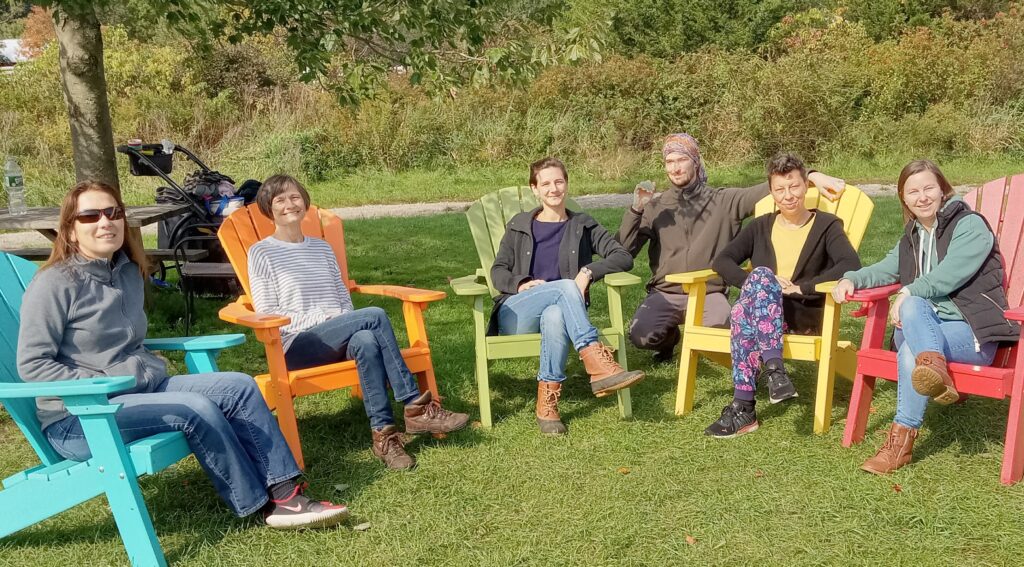
You are planning a big change regarding your family kindergarten… Why?
Enikő: I will retire next year. I have always had a very close relationship with my grandchildren and I don’t want to lose that. My youngest grandchildren are both finishing first grade here, but I wouldn’t be able to work with them next year. Just as I spent my time with my children when they were young, I want to be able to spend time with my grandchildren, too. Running the Aprókfalva is very intensive work. Between that and caring for my ailing father, I have no time for anything else. On top of that, our daughters are moving out of New Jersey, so Jancsi and I want to follow them. I told all the parents that if this program is important to them, they should find someone who’s willing to take over. They don’t need to have a teaching degree, just have to be willing to learn, dedicate themselves to this work and have a passion for children and quality education. I’m willing to stay on a little longer to teach them and get them started. If it’s not so important to the community, then that’s fine, too. Our materials—all the poems, games, teaching tools that we have gathered or made over the years—will not be lost, just set aside. They won’t become obsolete, these are basic materials of general education, Montessori principles, and Hungarian values that will be just as useful in teaching my great-grandchildren and their peers as they have been till now. I confess, my heart is a bit heavy since we’ll be closing our doors before our 20th anniversary. I’ll miss it greatly.
Why don’t you take it over, Réka?
Réka: At my age, my mother didn’t want to run a kindergarten, either. She wanted to spend her time and energy on her own children. It’s the same for me. Right now, I teach my own children and some of their peers in the learning pod. I’m willing to continue that for now, but I’d like to eventually put my veterinarian degree to use. The reason I got a doctorate was to go into that line of work. Life has given me a bit of a detour, but that’s still my passion. For someone to take over Aprókfalva, children and early childhood education has to be their passion.
Read more Diaspora interviews:

